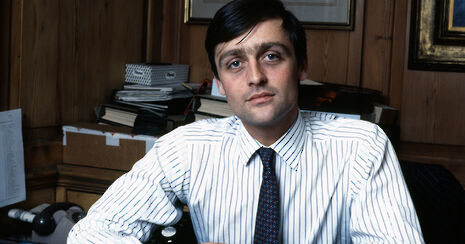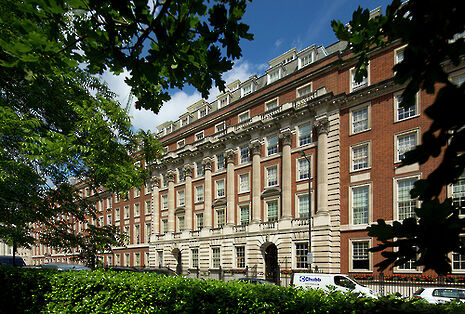The Grosvenor fortune shows the elite still aren’t paying their fair share
Trust funds and charitable statuses are allowing the rich to remain rich and the poor to remain poor

This August, our attention was diverted from the nascent Burkopolis on the beach fronts of France and instead turned briefly towards the Grosvenors: the family for many centuries in charge of one Britain’s loftiest sinecures – the Dukedom of Westminster.
When Duke Gerald Cavendish Grosvenor died on the 9th August, his estate, replete with most of Mayfair and Belgravia and totalling over £9 billion, passed on to his eldest son, Hugh – his daughters, of course, being immune to inheritance.
For a man who spent most of his life richer than a hundred-time lottery jackpot winner, Gerald Grosvenor was not at ease with his wealth. A recent article in The Spectator paints a picture of a morose and beleaguered man. Indeed, he was famously quoted as saying that given the choice – which he never had – he wouldn’t be wealthy.
This is a preposterously privileged moral conundrum. In the first place, it is ridiculous that there still exists a class of people upon whom obscene wealth is bestowed simply according to genes and lineage. Even more ridiculous still is the notion that some of these people, with the late Duke seemingly included, seem to regard death as the one way to cast off the riches they never wanted: one last great moment of farewell catharsis.
Make no mistake, however; while his resultant philanthropic efforts are beyond reproach, the tortured soul he claims to be does nothing to ennoble the broken and unjust system of which he was a part. It’s bizarre that the monarchy is so often ring-fenced in discussions of social inequality.
Some say that inequality is growing, with Theresa May’s stance on issues such as human rights perhaps an ill-omened portent for things to come. With a growing divide, though, has come a growing conversation around it. Why, then, is the aristocracy, surely one of Britain’s largest repositories of unchecked wealth, allowed to remain out of the social mobility equation that so desperately needs balancing?
It would be nice to simply suppose that the changing of the guard at the Grosvenor family seat became a major story due to one of a number of pretty run-of-the-mill media factors: the untimely death of a high-profile public figure, the involvement of the aristocracy, and so on.
It soon transpired, however, that there were some rather uncomfortable aspects to the case, such as the passing of £9 billion, untrammelled by tax, between two white males, both of whom were already wildly rich at the taxpayer’s expense due to a hereditary quirk of fate now centuries old.
Or such as the fact that this same £9 billion windfall has gone straight into the pocket of a 25-year-old barely out of university. It’s been mentioned that the new Duke’s late father was a restrained man who was quiet and unimposing about his wealth – not so for the young Hugh. Tales of his bacchanalian cavorting are plastered all over the internet: posing with sex dolls; hands around women at pyjama parties; and, most exuberantly of all, his 21st birthday bash at the family estate, for which Michael McIntyre and Rizzle Kicks were drafted in to perform. If that last item conjures up hazy notions of one thing – a May Ball – you’re not alone.

The similarities between Cambridge and the Grosvenors don’t end there. While the pastures of the King’s College cows hardly rival the Grosvenor Group’s 10,872-acre Cheshire pile, the colleges operate their own financial tricks, filtering some of the peskier taxes and costs normal bodies would incur.
A few years ago, Varsity conducted an investigation in conjunction with Cambridge University Student Union (CUSU) which revealed some less than venerable investment practices on the part of the colleges – with Peterhouse and Trinity College being singled out for criticism. As well as buying up shares in several corporations linked to human rights infringements or environmental pillaging, Cambridge colleges enjoy charitable status. This means that any derived profit from their extensive investment portfolios is exempt from taxation.
Cambridge is not the only educational institution to (ab)use legal designation as a charity – many private schools often acquire the same status. In these instances, however, the profits don’t feed solely back in to renewing and improving the education the schools provide. Instead, these schools advertise their ‘charitable’ status to already wealthy parents by allowing them to invest money under the guise of fee downpayment – with untaxed returns.
Just a wily manipulation of the rubric? Perhaps. But should not such institutions, beset as they are by accusations of elitism and social bias, be seen to pay their way just like everyone else? At least, in our defence, the profits gained from these tax-savvy measures go on to fund world-leading research and the provision of high-calibre undergraduate education. Hugh Grosvenor, who can hardly be said to have earned his inheritance in the first place, will most likely do neither of these things with his £9 billion nest egg.
If your opinion is some version of ‘good on them, tax is for losers’, then there are plenty of paths for you to go down. Consider putting yourself forward for the dukedom next time round. Applications are open never and essential skills include sharing Grosvenor DNA. Good luck!
 Interviews / ‘People just walk away’: the sense of exclusion felt by foundation year students19 April 2024
Interviews / ‘People just walk away’: the sense of exclusion felt by foundation year students19 April 2024 News / Controversy on the Cam: John’s spend almost 90 times more on rowing than other colleges19 April 2024
News / Controversy on the Cam: John’s spend almost 90 times more on rowing than other colleges19 April 2024 Theatre / The closest Cambridge comes to a Drama degree 19 April 2024
Theatre / The closest Cambridge comes to a Drama degree 19 April 2024 News / Corpus student left with dirty water for over six months21 April 2024
News / Corpus student left with dirty water for over six months21 April 2024 News / Emmanuel College cuts ties with ‘race-realist’ fellow19 April 2024
News / Emmanuel College cuts ties with ‘race-realist’ fellow19 April 2024





